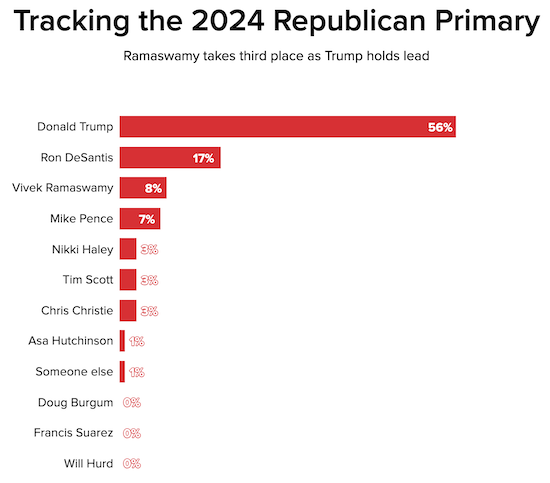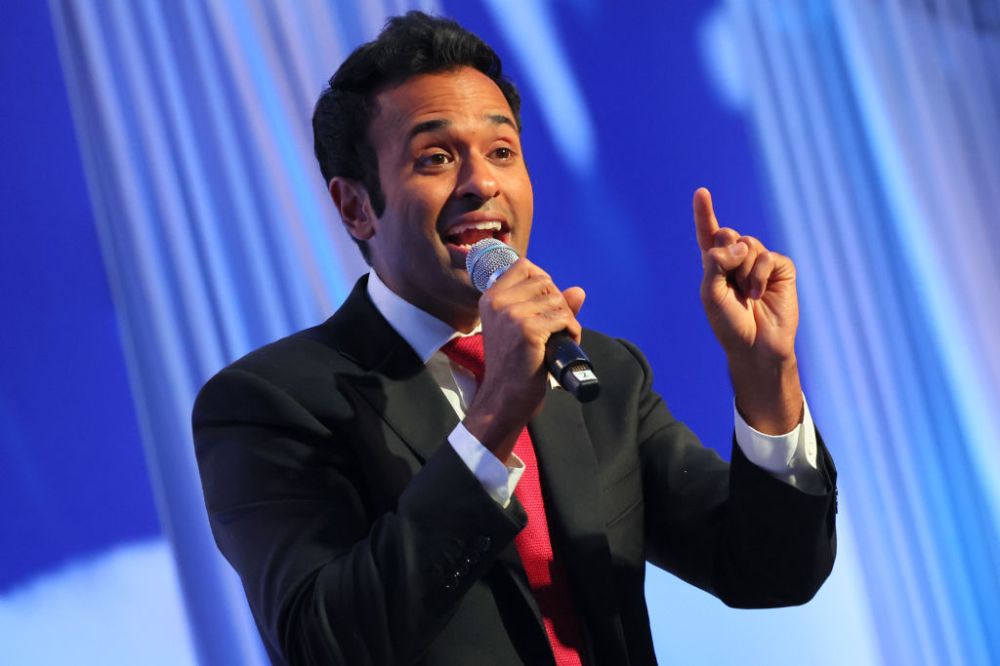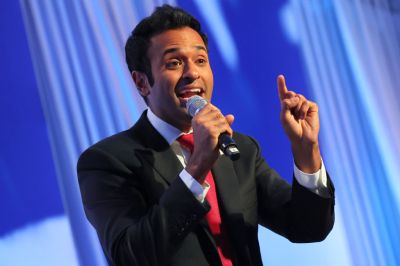Can a candidate polling at 2.4 percent properly be said to have “momentum”?
Maybe not. When you’re in seventh place—behind Chris Christie, for cripes’ sake—you’re not lighting the political world on fire. Vivek Ramaswamy won’t be the Republican nominee for president, we can safely say.
That he won’t end up finishing second in the primaries, ahead of Ron DeSantis, is less safely said.
The national polling average suggests that the businessman from Ohio is no threat to the governor of Florida, who stands at 20.9 percent. But some surveys published over the last month show signs of growth for Ramaswamy, distinguishing him as the only Republican in the field whose numbers are trending upward.
Given the trends in DeSantis’ own polling, one wonders how long it’ll be before their paths cross.
A Fox News poll conducted in late June found Ramswamy inching up to third place, still 17 points behind DeSantis but slightly ahead of conservative luminaries like Tim Scott, Nikki Haley, and Mike Pence. Last week a national survey from Echelon Insights put him in double digits, trailing Florida’s governor by a scant 6 points.
Trends aren’t officially trends until there are three data points to support them. On Tuesday, Morning Consult provided the third: They too have Ramaswamy climbing and now within single digits of DeSantis.

Ramaswamy outpaced Trump’s own former vice president when Trump voters were asked who their second choice was, taking 16 percent to Pence’s 14. DeSantis remains the top second-place choice with 39 percent, but for how long?
There’s some anecdotal evidence of Vivekmania as well. Last month political consultant Sarah Longwell conducted several focus groups in Iowa with voters who had supported Trump in 2016 and 2020. Her takeaway: “Of the voters that were interested in moving on from Trump (a clear minority), many of their heads were saying DeSantis, but their hearts were saying Ramaswamy.”
Lastly, if Google is any indicator, there’s more curiosity out there about Vivek than there is about any of the candidates who are currently behind him.
As proof that DeSantis’ campaign has begun to hear footsteps, consider its evolving position on the Republican debates. Until recently it looked like the governor would follow Trump’s lead by skipping any debates that the frontrunner skipped, part of his strategy to convince GOP voters that the primary is a two-man race. The also-rans could hold a forum if they liked but the serious contenders wouldn’t deign to accept a seat at the “kiddie table.”
Within the past week, DeSantis has reversed course and confirmed that he’ll debate whether Trump shows up or not. At this point, between the rise of Ramaswamy and his own disappointing polling, there’s no way to argue with a straight face that it’s a two-man race. It’s a one-man race with the governor stuck at the kiddie table because, for now, he belongs there.
All of this is upsetting. And quite funny.
It’s upsetting if you believe, as I do, that DeSantis is (was?) the right’s only hope of defeating Trump in the primary. Vivekmentum wouldn’t be possible if populists eager for new blood were rallying to the governor, as DeSantis’ strategy imagined they would. If and when Ramaswamy passes him and edges into second place, the stench of death will be upon the Floridian’s campaign.
That’s so even though other candidates had dismal polling spells during previous Republican primaries before roaring back to win. Mitt Romney endured surges from Rick Santorum, Newt Gingrich, Herman Cain, and even Michele Bachmann before the party settled on him. Ditto John McCain, whose campaign faltered so badly in 2007 that it appeared he might run out of money and quit before the first primaries were held.
But Romney and McCain had no one of Trump’s stature within the GOP standing in their way. And neither was hyped as “the future of the party,” a political talent so fresh and formidable that he might plausibly change the ideological direction of the American right while steamrolling all comers en route to the presidency.
DeSantis was cracked up to be the Chosen One, the ultra-electable quasi-conservative apprentice destined to slay his sinister populist master. If he were to slip behind Vivek “Who?” Ramaswamy, the lost luster would be unsurvivable.
It’s enough to make an anti-Trumper cry. And laugh.
What could be funnier, after all, than Florida’s tryhard authoritarian governor spending years pandering to the modern right’s worst impulses only to be overtaken in a national primary by a fast-talking Fox-friendly nobody with a knack for babbling about woke-ism?
The entire legislative agenda in America’s third-largest state this past spring was designed to give DeSantis a reservoir of populist credibility so immense that it would drown even Donald Trump. Trump is a boaster, DeSantis is a doer; what the governor lacks in cheap charisma he more than makes up for by delivering policy results for Republican voters. That was the theory of DeSantis’ case for the nomination.
Now here we are, six months out from the primaries, and not only is he lagging badly behind a guy whose chief political talent is charismatic lib-baiting, he has another sneaking up on him from behind. How can you not laugh?
How can you not laugh at the horror our friends the anti-anti-Trumpers must feel, having stuck with this rotten party through two Trump nominations and accommodated themselves to DeSantis’ post-liberal agenda—whatever that might mean for their remaining conservative principles? They’ve spent eight years making excuses for the MAGA-era GOP by dutifully insisting that, no matter how bad things get, Democrats remain worse. Their reward was supposed to be a Republican nominee in 2024 with whom they’re more comfortable. Yet the great anti-anti-Trump hope is increasingly at risk of being pantsed by … Vivek Ramaswamy.
Not Tim Scott or Mike Pence or even Tucker Carlson. Vivek.
There aren’t enough Disneys to demagogue, anti-vaxxers to flatter, and illegals to dump in Martha’s Vineyard, it seems, to assure Ron DeSantis of a 10-point lead over a guy no one had heard of a few months ago. If there were a universe in which his humiliation didn’t necessarily lead to Trump’s nomination, this would be the most gratifying storyline of the campaign. We don’t live in that universe, alas.
None of this is to imply that Ramaswamy owes his polling rise entirely to DeSantis’ weakness, however. (He does in part, of course.) We should give Vivek his due.
He’s good on the stump, a more effective retail presence than the man who won reelection in Florida last fall by 19 points. Go watch him handle a heckler on abortion in Iowa with enviable aplomb. Or take in his exchange with Don Lemon from April, unflappable as ever. “He is known for almost never turning down an interview request,” FiveThirtyEight noted on Monday in a piece about Ramaswamy’s rise. The candidate has learned the biggest lesson of 2016: If you’re skilled at media combat and you do a lot of it, good things can happen to you in a Republican primary.
He has other Trumpian attributes. He’s very rich, having succeeded wildly in business. He’s a political “outsider,” a useful thing to be in a party that’s been overrun by pitchfork populists. He’s unstained by the legacy of the pre-Trump GOP, a problem for DeSantis that the governor can’t plausibly solve. And he has a knack for attention-grabbing political stunts and soundbites that reliably deliver coverage. It may turn out that governing Florida impressively as a populist doesn’t captivate Republican voters the way performing impressively as a populist on CNN does.
Go figure that a party led by Donald Trump might prioritize that way.
Some of Ramaswamy’s attributes that aren’t so Trumpy are also helpful to his cause. He’s just 37 years old, promising Republican voters the starkest possible contrast in a general election with our wizened Democratic president. And he’s nonwhite, which some would say is a liability in a GOP primary but which I tend to think is an asset. (Vivek does face a special cultural challenge that other minority contenders do not, however.) Nonwhite candidates have done well in the last few primary cycles, earning the admiration of right-wing voters for bucking the left’s racial expectations and tempting them with the thought of such a figure carrying their message into political battle. Few things in politics are as powerful as a member of the other “tribe” validating your beliefs.
When Ramaswamy met last month with Politico’s editors, he introduced himself this way: “I think of myself as more of the unapologetic nationalist in this race. Call me a nonwhite nationalist, if you want.” Vivek is many things but he’s not stupid. He knows who his audience is.
His secret sauce is authenticity, I think, again befitting a populist era. He speaks passionately and fluently about the right’s culture-war hobby horses. His “creative” new fundraising scheme has been cannily branded as an effort to destroy “oligopoly.” He’s even got the new right’s shtick about Volodymyr Zelensky down pat. It may be and probably is true that he’s running for president for no reason grander than landing his own weekend show on Fox News, but he does a convincing impression of a man who’s been thoroughly red-pilled and can’t contain his enthusiasm when proselytizing about his new faith.
If you’re a populist who’s done with Trump for whatever reason but finds DeSantis underwhelming, Vivek is your guy. I don’t know what his ceiling is but I suspect it’s higher than 10 percent.
DeSantis should worry about having to face Ramaswamy at the first debate. Especially if Trump isn’t there and the governor becomes the prime target for the other candidates.
Ramaswamy has the intellect, the performance chops, and the political incentives to attack DeSantis effectively. They’re competing for the same populist voters; they’re battling for second place (in some polls); and a well-done takedown in the Gabbard-versus-Harris mold will ensure loads of free coverage, introducing Ramaswamy on favorable terms to millions of primary voters who haven’t formed an opinion of him yet.
According to Morning Consult, DeSantis’ favorability among Republicans stands at 66/21. That 45-point spread is second only to Trump’s (74/24) but Ramaswamy isn’t far behind. At 49/13, his unfavorables are the lowest in the field of any candidate with at least 1 percent of the vote. And whereas just 13 percent either haven’t heard of DeSantis or have no opinion of him, 38 percent say the same of Vivek. He has a lot of room to grow.
If I had to bet on which of them will benefit more from the debates, I know how I’d bet.
Ramaswamy has another advantage over DeSantis, the indifference of Donald Trump. That helps explain the difference in their favorable ratings, of course: If Vivek had taken the kind of fire from the frontrunner that the governor has, his numbers wouldn’t be so rosy. In theory, that portends a rough patch for Ramaswamy if and when he overtakes DeSantis for second place, since at that point Trump will begin attacking the new guy to try to halt his rise.
I’m skeptical, though. Ramaswamy isn’t a threat to win the nomination the way DeSantis is; he’s been so obsequious toward Trump, in fact, that I’ve wondered at times if he’s a stalking horse. He hasn’t offended Trump the way the governor has either, repaying his endorsement in the 2018 Florida gubernatorial primary by trying to end his political career five years later. Rather than attack Vivek after passing DeSantis in the polls, I suspect Trump would celebrate him, relishing the humiliation of his “disloyal” protege.
He might even praise Ramaswamy to help solidify his hold on second place, making a DeSantis comeback more difficult. Eventually there would be vice-presidential chatter, assuming the rumors are true about Trump’s new roommate having at last worn out her welcome.
A thought to consider: If DeSantis does end up crumbling and Ramaswamy finishes a respectable second in Iowa and New Hampshire (the latter state loves mavericky outsiders, don’t forget), what might that mean for the Republican presidential field in 2028?
“They’re going to nominate Trump again in 2028,” you might say, wearily. And, well, yes. Point taken.
Imagine Trump retires, though. If he and Vivek finish atop the 2024 field, leaving a host of smart, experienced Republican officeholders in the dust, which smart, experienced Republican officeholders will bother running in the next cycle?
If you’re Brian Kemp or Glenn Youngkin, why would you go to the trouble of raising millions of dollars, building a sizable national organization, and constructing a detailed policy platform in the full expectation that some rich bombthrowing “outsider” like Tucker or a random anti-woke CEO somewhere will jump in the race and eat your lunch? What evidence will there be that any professional politician—even one like DeSantis who spends every waking hour scheming up exciting new ways to pander to populists—stands a chance in a modern Republican presidential primary?
Maybe it depends on how Trump fares next November.
As low as my regard is for the GOP base, even I tend to believe that at some point the party might lose enough elections to teach Republicans a few hard, unwelcome lessons. A landslide defeat in 2024 might at last convince them that everyone who told them Trump is unelectable (like Ron DeSantis) was right after all. Were that to happen, the GOP would spend the next four years debating whether Trump was the problem or whether Trumpism was. Insofar as there’s a constituency for the latter position, that might open the door for a Kemp or Youngkin.
But if Trump doesn’t lose in a landslide, it’ll affirm the right’s belief that illiberal populism is viable nationally. He won in 2016 and came perilously close to winning again in 2020; if he were to barely miss again in 2024 it would “prove” that there may have been a problem with Trump but there was certainly no problem with Trumpism. All they need to do to win is find a new “outsider” with the same burn-it-all-down fervor as Trump but with less baggage. Perhaps that’s Vivek, or Tucker. Perhaps it’s someone we haven’t heard of yet.
But it ain’t Brian Kemp or Glenn Youngkin. Or, in all likelihood, Ron DeSantis.
If that bothers our friends the anti-anti-Trumpers, it would behoove them to make sure Trump’s defeat next fall is as emphatic as possible. That’s the only thing that might force the Republican base to rethink its approach. And if, for reasons of zombie partisanship, the anti-antis can’t bring themselves to do that, they should accept the consequences. From here on out, it’s Viveks all the way down.







Please note that we at The Dispatch hold ourselves, our work, and our commenters to a higher standard than other places on the internet. We welcome comments that foster genuine debate or discussion—including comments critical of us or our work—but responses that include ad hominem attacks on fellow Dispatch members or are intended to stoke fear and anger may be moderated.
With your membership, you only have the ability to comment on The Morning Dispatch articles. Consider upgrading to join the conversation everywhere.